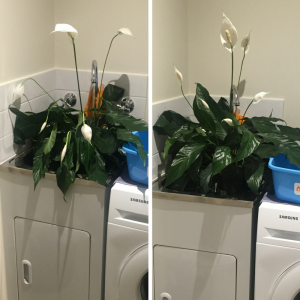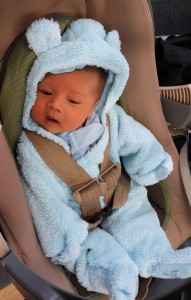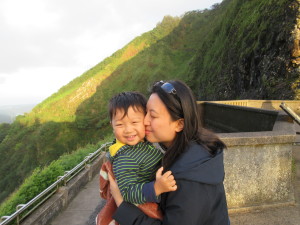For my birthday this year, one of my best friends gave me a very special present: my first ever plant! It is a peace lily (for us non-gardening types, you may know it by its less scientific name, the-one-with-the-wide-green-leaves-and-the-upright-white-flower-bits).
I was promised it (and the other plants we bought on the same expedition) would be ideal for a novice gardener like myself. ‘Low maintenance’. ‘Hardy’.
Six months later, and I’m pleased to report that my plants are still alive and – for the most part – well. Although we have had our ups and downs.
Particularly my peace lily. It turns out lilies need a fair amount of watering, and it took us a while to get into a routine. Especially after I went away for a few days.
When I came back, I could see its leaves drooping – and drooping. I panicked. I watered it, but the next morning it still looked sad. I was convinced this was the end. Surely I couldn’t coax my plant back from the brink of its drooping decline.
I talked to my friend (who is an excellent gardener), and she told me to take it to my laundry sink and leave it under a running tap for five minutes, then let it drain in the sink overnight. I was skeptical, but did exactly what she said.
The next morning, when I woke up I couldn’t believe my eyes. My plant had gone from looking like a forlorn, disgruntled swan and the lilies had returned to their perky upright selves.
What a difference water makes! I could see the difference for myself.
Isaiah 58:11
The Lord will guide you continually, and satisfy your soul in drought, and strengthen your bones. You shall be like a watered garden, and like a spring of water, whose waters do not fail.
If you’ve ever been thirsty, you know how amazing that first sip of water tastes. If we hadn’t ever experienced drought, we wouldn’t appreciate what it would mean to be connected to a source of water that won’t fail. A watered garden means that a gardener is tending it. And unlike me, who may occasionally forget to water my plant, God is there continually to guide us, to satisfy our soul and to give us strength.
Throughout winter, I watched in dismay as the lilies changed from white to brown, and eventually dropped off. My peace lily became all leaves and no lilies. I kept watering it. And in spring, I was so excited to glimpse the first lily as it bloomed – and then another – and another (I’m now up to four!). Each one seems like a miniature miracle to me.
In parables, Jesus often uses examples from nature – vines, branches, fruit. Things that grow. Things that require care. And things that flower, and bring forth fruit.
John 15: 5, 8
I am the vine, you are the branches. He who abides in Me, and I in him, bears much fruit; for without Me you can do nothing… By this My Father is glorified, that you bear much fruit; so you will be My disciples.





